| |
Dr. Dmitry Ivashintzov, Russia
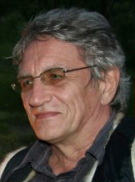
Professor, Honoured Worker of Science of the Russian Federation, full Member of the Academies: Russian Academy of Natural Sciences, RIA, MANEB, scientist, water-power engineering specialist, poet and philosopher.
Professional interests: problems of risk in the field of water-power engineering, evolution of the person, cultural science. Main scientific employee is the Russian Institute of Water-power Engineering of V.E.Vedeneev. Cochairman of the International Association RUSSIAN CULTURE. Honorary Professor of UNESCO Department at St.-Petersburg. Editor-in-chief of the almanac "Russian World". Chairman of the Russian National Committee of Hydraulics (MAGI). The basic publications: philosophy: Outside of Homo Sapiens Evolution: http://phenomen.ru/public/journal.php? article=68; poetry, 60+ poems: http://www.stihi.ru/avtor/ivashintsov. The GHA Honorary Advisory Committee Member and one of the “Peace from Harmony” and GHA founders in 2005. Address: St.-Petersburg, Russia; E-mail: ivashintsov@gmail.com; Web: http://www.peacefromharmony.org/?cat=ru_c&key=42; http://www.peacefromharmony.org/? cat=ru_c&key=23; http://www.russkymir.org.
---------------------------------------------------
Dmitry Ivashintsov
Inevitability of Russian World The title of the civilizational project we propose deliberately unites two eras of Russia's development and two mental outlooks. It is a sort of bridge between past and future. Its first part is grounded in modernity and looks into the future from the present. The second part bears on philosophy and ontology and relates to the foundations of Russian philosophy of the XIX century. Thus, Russian World project aspires to create an ethnocultural community, with the traditions of Orthodoxy, Russian language and Russian culture as the ontological pivot, and modern information technologies providing structural cohesion. The objective of building up Russian World is to ensure conditions whereby Russia and Russian World will occupy a fitting rank in the international hierarchy, and the citizens of Russian World will be able to have a decent life (materially and spiritually), irrespective of their residence. Neither in our writings nor in our public speeches do we talk about exterminating or discriminating against other cultures in Russia, or set Russian culture against the culture and traditions of other ethnic groups of the world. Likewise, we do not see Russian culture as something separate from general Slavic culture. Meanwhile, we agree with those who emphasize the specificity of our culture, speak up about its historical roots and is concerned about the preservation and development of Russian culture as one of the world's recognized cultures. If I am to try to point at the biggest challenges, those include: tendency to transform Russian culture into a culture that is dead and has no support or prospects for reproduction in its major bearer — the Russian person; attempts at drowning our culture in the mass culture of the globalized humankind.
Speaking about the first threat, of greatest concern is the demographic situation in primordially Russian areas, such as Pskovskaya, Novgorodskaya, Vologodskaya regions. The catastrophically low living standards of the rural population, the lack of employment opportunities for the city dwellers, drug addiction among the young, alcoholism affecting all social strata — all this can result in a disappearance of the main carrier of the vibrant Russian culture. The second threat — unification of cultures — is being discussed quite on a large scale and, seemingly, does not call for out intervention. However, a mere acknowledgment of each culture's significance for the global civilization will hardly help to preserve the erstwhile diversity. Above all, it is for us to examine the origin and historical mission of Russian culture, to understand and rationalize its role in the future of the world. We should look more attentively at the education reform currently underway and protect the young generation against the pandemy of thoughtless and immoral voyeurism of "reality-shows," the unstoppable flow of trashy potboilers and movies. Obviously, market economy dictates the rules, and yet government and civil society, the making of which in Russia is being so difficult, should be promoting, including financial assistance, the implementation of projects which will publicize the fine works of Russian art of past and present. Fellow Russians living abroad, especially descendants of the first-wave émigrés, can provide us with invaluable support in preserving the originality and authenticity of Russian culture. A prompt implementation of our Association's project of establishing in Petersburg a museum of Russian culture abroad can become a pivotal point for returning to Russia many priceless documents. Finally, we should be creating new symbols of modern Russia, designed to affirm Russia's spiritual and political grandeur. The enactment of an ordinance by St.Petersburg governor on putting up in Kronshtadt a monument to a Patriarch of Russia, a patron saint of the Russian fleet — apostle Andrew the First Called — would seem an appropriate step in this direction. As is made clear above, there are two tendencies related to our project: dispersion and accumulation of Russian World. We believe that dispersion can become constructive, and accumulation — mutually enriching. The motto of the Association of Russian cadet corps abroad —"Dispersed, but not disconnected" — seems very pertinent in this respect. The inevitability of Russian World is bespoken by the fact that Russian World exists already in the millions of hearts of our compatriots living in all parts of the world. Dmitry Ivashintsov, PhD, Professor, Vice-President of the Russian World Association,
St.Petersburg, Russia __________________________________________ Drawings of Russian children on the Christian themes Ekaterina Volodkina, 10 years, 2002, Kostroma . "Saint Ekaterina"
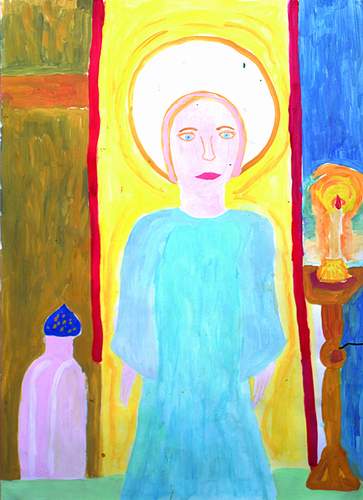
Anna Basova, 12 years, 2002, Kostroma . "Rescue on Debryh".
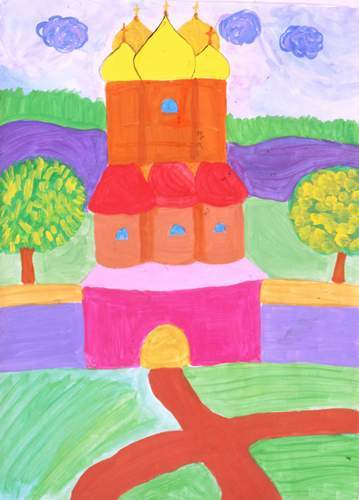
Olga and Alexander Teleznue, 5 and 10 years, 1999, St.-Petersburg. "Seas Angel".
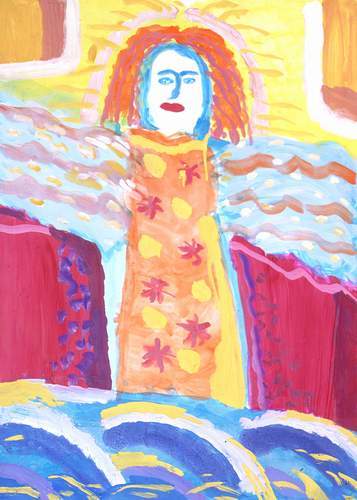
Valentina Chernenko, 11 years and Dina Alexander, 13 years, 2005, St.-Petersburg.
"Cover Mother God above Leningrad ".
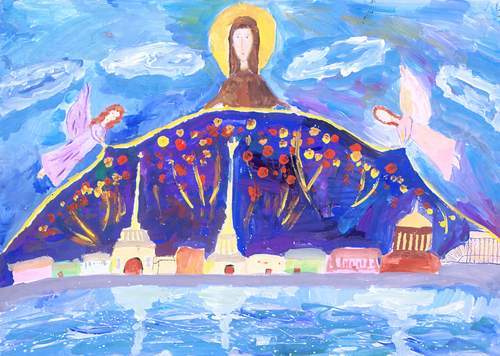
Ivan Yudrenov, 9 years, 2002, Kostroma . "Ipatievsky Monastery".
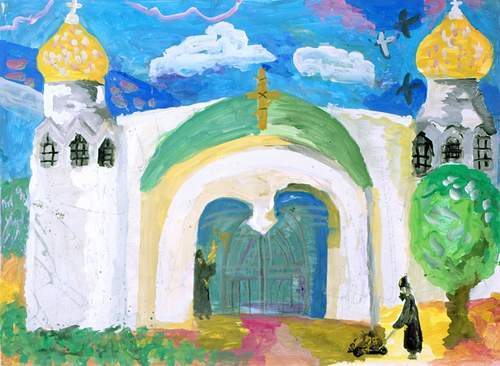
Yliana Kremcheeva, 6 years, 2000, St.-Petersburg. " Mother God of Affection".
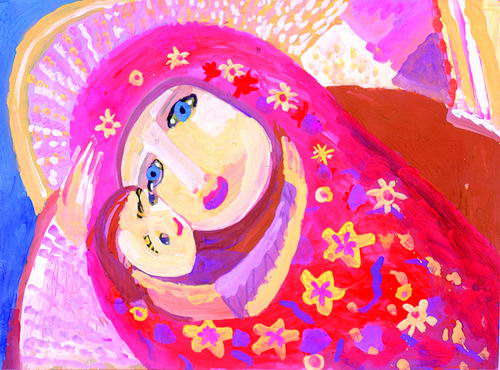
Irena Golubeva, 7 years and Alexander Sorokin, 7 years, 1999, St.-Petersburg.
"Angel - Keeper".
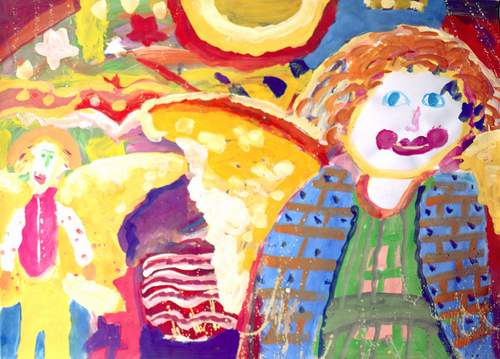
Up
|